When you become a parent, you know there are things you will have to teach your child. Things like; "Don't put that in your mouth", use the potty, "Say please and thank you", learn your ABCs and 123s. Other stuff happens as a reaction, like no hitting or biting (or swearing.. oops) and be gentle with animals. Then there are the things that you don't realize need teaching until you are faced with them head on.
For instance, how to behave in a social situation, or how to make friends.
For instance, how to behave in a social situation, or how to make friends.
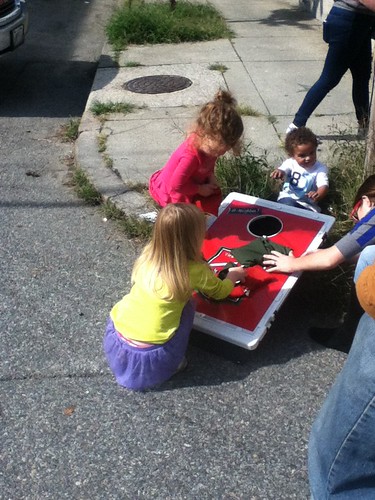
For me, the hardest lesson to teach, and to accept myself, has been "not everyone is friendly". In other words; "leave people alone if they don't want to interact with you". When Aurora first learned that she could get a reaction from people by smiling or talking to them, it was incredibly exciting for her. When she was a baby, she would wave at everyone and there was nothing more frustrating for me than watching people go out of their way to ignore her. At that age, though, she was oblivious and, because I was always holding her and she had a short attention span, the moment usually passed quickly. These days, though, she is more persistent. If someone doesn't acknowledge her, she will often go out of her way to get their attention.

Many people respond well, but others, not so much. She is curious about everything and it's her job at this age to learn about the world around her. This includes the people she sees every day. She wants to know about them too. She is learning important information about how to interact with others. This is something that could set the stage for her entire social life. How do you explain to your child, who is just trying to make friends, that many people don't want to be bothered? She knows that I love her. She knows that the people she sees on a regular basis like her. She knows that she can make friends with other kids and some other adults. But... what about that guy on the bus giving her a dirty look for asking too many questions?
If other kids don't mind her questions and most people will interact with her in a very age-appropriate way, why can't everyone?
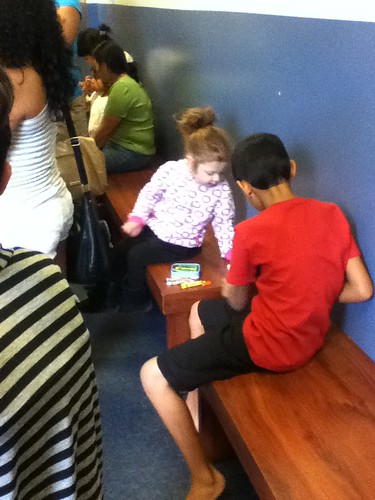
Aurora is extremely social... I'm sure she gets that from me. She is not shy and has no problem voicing her opinions. She loves interacting with other people and I think it's important for her. Moreover, she's really GOOD at making friends. Whenever we're in a situation where there are other kids, she gravitates towards them in a very natural way. Sometimes, it's as simple as sitting next to someone until they notice her.
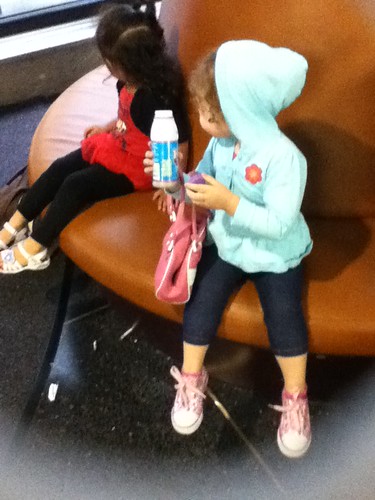
Sometimes she plays alongside and occasionally she will ask about something the other kid is doing.
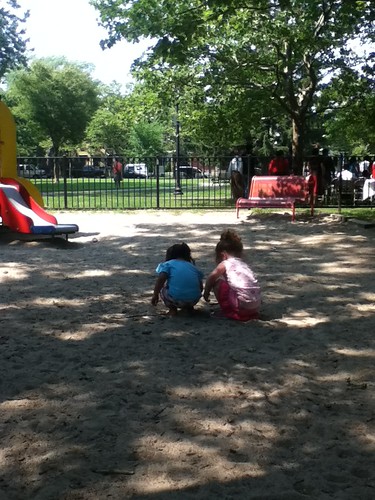
Sometimes, she goes so far as to give a random person a giant hug...
for no apparent reason other than the simple fact that she wanted to.
for no apparent reason other than the simple fact that she wanted to.

Almost universally, the other kid responds well. It is the parents (myself included) that stand by waiting for something to go wrong. Why is that? Most kids are born with a natural ability to make personal connections and we, as parents, spend their formative years discouraging it! We do this by imposing our own prejudices on them or by outright teaching them to be more reserved. What is so wrong with giving someone a hug just because you want to? Why is it such an imposition when someone we don't know starts a conversation? These are adult hangups and we have no right to train our kids the same way when all they want to do is make friends. I think it's wildly unfair. However, I also recognize that we are a society that revolves around everyone having a bubble of personal space that no one should invade. I know that some people will react poorly if Aurora is always so outgoing. I also realize that some people may not have the best intentions.
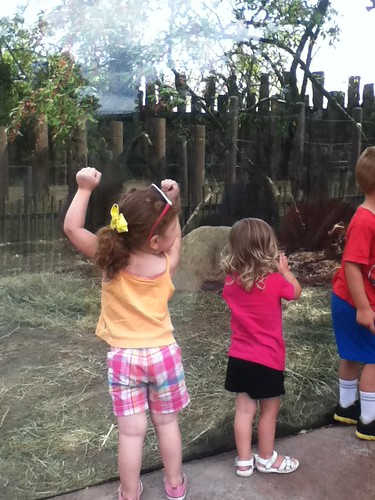
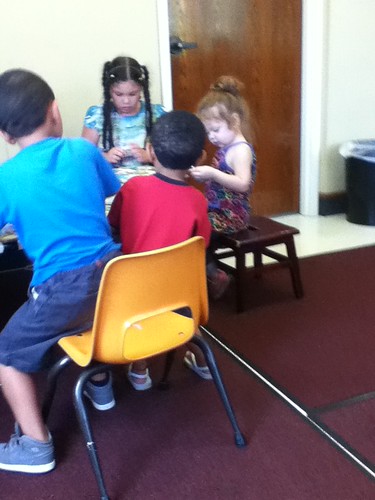
I think learning to trust your instincts is more important. I've rarely, if ever, been wrong when I get an uneasy feeling about a person. This is something we all have the ability to recognize. Some people make your hair stand on end, others you want to cross the street to avoid talking to, some people are fine to talk to but you question the validity of everything they say. We can all see these things. However, it took me many years to fully trust that instinct. Why? Because I grew up with a "don't trust strangers" mindset. Then, as I grew older, I realized that if I never trusted strangers, I would become a creepy unemployed and reclusive cat-lady who never made friends or had lovers and who would inevitably die alone.
The truth is we NEED strangers in our lives. They help us learn and grow and without them we would be incredibly lonely. Not to mention the fact that we would never get jobs or go on dates or make new friends.
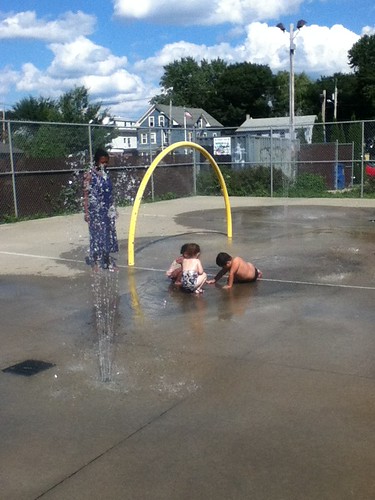
Reconciling these two truths became very hard when I was in my teens and early twenties because I never had to rely on my gut before. Strangers were bad... period. Upon the realization that strangers were actually very important, it became hard to decide which ones were trustworthy. I had completely lost touch with that basic social instinct that we are all born with. I had no bullshit detector. I didn't know when people were just using me. I found myself believing people when they said they were telling the truth, even if a tiny part of me knew they weren't. I was desperate to let people get close to me and I made quite a few poor decisions as a result. Then, I sort of went the other way...
TRUST NO ONE.
I spent the majority of my mid-twenties as a jaded and miserable person. I thought everyone had ulterior motives. I assumed that I would never find someone who genuinely loved me. It took me a very long time to let all of that anger and disappointment go. I often wonder how much heartache I could have avoided if I had a better grasp on how to judge people. Is it really just a matter of getting older and wiser?
I think that is part of it, of course. But I also believe that we are fundamentally set up for failure because we never learn how to socialize.
I think that is part of it, of course. But I also believe that we are fundamentally set up for failure because we never learn how to socialize.
Almost everyone I know has similar childhoods. They had a select group of friends that didn't change until school, if it changed at all. For the most part, the only adults in their lives were relatives. I can't remember any significant childhood memory that involves someone outside of my family or my two friends growing up. Granted, I also grew up in the time of 'children are seen and now heard'. I'm sure this also played a part. The thing is, the memories I have of my family are mostly amazing ones. They were adults who interacted with me in a way that was different from my parents. I learned things, I grew, and these moments stuck with me. Imagine how many more I might have had if I had met more people?
So how do we bridge this gap between "don't talk to strangers" and "only talk to the right strangers"? For us, so far, it has been a matter of teaching Aura that "not everyone is friendly" for now. She is allowed to say hello to whoever she wants (as long as she is with me). If they don't want to talk to her, I redirect her and explain later. Sometimes even when she is initially well received, she gets too excited or tries to touch people which makes them uncomfortable. In those situations, I tell her to keep her hands to herself and if she can't calm down, I redirect her. She seems to be picking up social cues little by little and will often get the hint that someone doesn't want to interact. On more than one occasion, she has told me "That person isn't friendly" which I always think is hilarious and which I secretly hope will teach the other person a lesson.
As she gets older, and is in situations where I am not right next to her, we will have to elaborate and learn the difference between strangers who are safe and those who are not. This raises a whole new set of issues. Is the person with the uniform on always friendly? How about the person teaching children's activities at the park? Are they always safe? How can you be sure they work there?


No comments:
Post a Comment